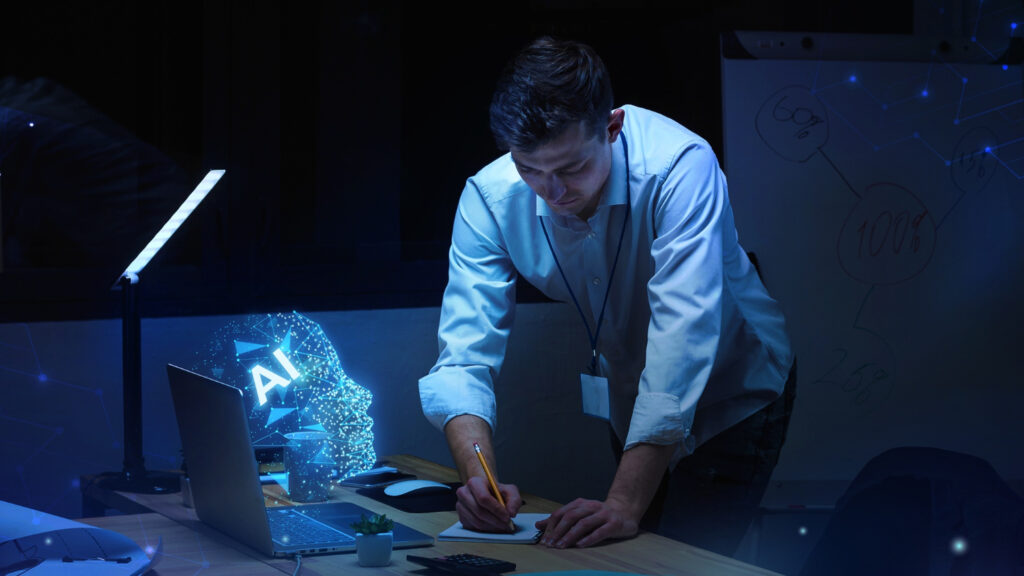Introduction: Overview of AI in Tech
Artificial Intelligence (AI) has drastically changed a number of businesses and job types in the technology sector. AI is a key driver of efficiency and innovation in the computer industry, not merely a trendy term. Artificial Intelligence (AI) innovations are changing the way we approach software development and problem-solving, from machine learning algorithms to sophisticated data analytics [1].
Artificial intelligence (AI) systems, like computer vision and natural language processing, are becoming essential to many services and applications. For software engineers in particular, who are at the forefront of integrating new technologies into workable solutions, this growth offers both opportunities and challenges [2].
Current Role: Traditional Responsibilities of Software Engineers
Traditionally, the goals of software engineers have been to design, develop and maintain software systems. Among their primary duties are [3]:
- Coding: Creating clear, effective and maintainable code in accordance with project specifications and needs.
- Debugging: Locating and resolving errors as well as problems in the software to maintain functionality and dependability.
- System Design: Creating software solutions by specifying interfaces, components and interactions inside the system.
- Testing: Putting the software through its paces and carrying out tests to make sure it satisfies quality requirements and operates as intended.
- Documentation: To ensure future developers can easily understand and utilize the code, system architecture along with development procedures, documentation must be created and kept up to date.
These duties ensure that software solutions satisfy technical specifications as well as user needs and are scalable, effective and functional [4].
Integration of AI: How AI is Changing These Roles
AI is fundamentally changing the role of software engineers by providing new tools and approaches. Here’s how.
- Automated Coding: AI-powered solutions like GitHub Copilot help engineers by proposing code snippets and automating tedious operations. This improves productivity and reduces errors [5].
- AI-powered debugging tools: May evaluate code for potential faults and provide patches, saving engineers time on manual debugging. These technologies utilize machine learning algorithms to identify patterns and abnormalities that human eyes may overlook [6].
- Smart Testing: AI automates test case generation and predictive analytics for increased efficiency. This leads to more complete testing coverage and faster defect detection [7].
- System Design: By offering sophisticated simulations and optimizations that were previously impractical, artificial intelligence (AI) helps designers with complicated systems. This aids engineers in developing software architectures that are more reliable and scalable [8].
Software engineering is becoming more productive due to AI integration, which also creates new opportunities for creativity and problem-solving.
Important AI-Related Skills for Engineers to Learn
With AI changing the software engineering sector, software developers need to acquire new skills to be competitive. Key competencies in AI are:
- Machine Learning (ML): Creating AI-driven applications requires an understanding of ML methods and methodologies. Deep learning, neural networks, as well as supervised and unsupervised learning are concepts that engineers should be knowledgeable about [9].
- Data Science: Mastery of data visualization and analysis is crucial. To power AI models, engineers must handle massive datasets, clean up the data and derive valuable insights [10].
- Programming Languages: It’s crucial to understand the languages like Python and R that are frequently used in AI development. Libraries and frameworks created especially for AI and ML are available for these languages [11].
- AI Frameworks: It’s helpful to be familiar with scikit-learn, PyTorch, TensorFlow, as well as other AI frameworks and tools. These frameworks facilitate the effective development and application of AI models [12].
- Ethics and Bias: Creating just and accountable AI systems requires an understanding of AI ethics and bias. Engineers need to understand how to reduce potential biases in data and algorithms [13].
Developing these talents will help engineers better meet the changing needs of AI systems while also improving their own capabilities.
Future Outlook: Predictions for the Future of Software Engineering
AI technologies are always evolving, shaping the future of software engineering. Here are some important predictions:
- AI will automate software development processes, including code generation and testing. This will result in speedier development cycles and less manual work [14].
- AI solutions can improve collaboration among software engineers by providing smarter code review systems and IDEs for real-time feedback and teamwork [15].
- AI can personalize software experiences by leveraging advanced data analytics and adaptive algorithms [16].
- Increasing emphasis on establishing ethical AI systems. To enable ethical AI adoption, engineers must address difficulties such as privacy, bias and fairness [17].
- AI integration with upcoming technologies such as quantum computing and blockchain presents new possibilities and difficulties for software programmers [18].
These developments point to a dynamic future for software engineering, with AI playing a key role in driving innovation and efficiency.
Conclusion: Summary of Key Points
Because artificial intelligence (AI) is bringing new tools and techniques that improve productivity, efficiency and creativity, software developers’ roles are radically changing. This is an overview of the ways AI is changing the industry:
- Changing Responsibilities: Traditional software engineering duties, such as system design as well as testing, debugging and coding, are being replaced by artificial intelligence. The way engineers approach their work is changing due to automation and sophisticated AI tools.
- New Skill Sets: In order to adapt, engineers must pick up new competencies in data science, machine learning, artificial intelligence and ethical AI development. In the ever-changing tech industry, having these skills is essential to being competitive and relevant.
- Future Trends: More automation, better teamwork and an emphasis on ethical AI are probably in store for the software engineering field in the future. Blockchain and other cutting-edge technology integration will bring new possibilities as well as difficulties.
Software engineers need to keep up with the latest developments in AI and adjust to these shifts in order to take advantage of new opportunities and successfully handle new difficulties.
References:
- “How Artificial Intelligence Is Transforming The Technology Industry”: https://www.forbes.com/sites/forbestechcouncil/2023/01/25/how-artificial-intelligence-is-transforming-the-technology-industry/
- “The Role of Artificial Intelligence in Modern Tech”: https://www.techradar.com/news/the-role-of-artificial-intelligence-in-modern-tech
- “The Role of a Software Engineer: Responsibilities and Skills”: https://www.coursera.org/articles/what-does-a-software-engineer-do
- “Understanding the Role of a Software Engineer”: https://www.udacity.com/blog/2023/01/what-does-a-software-engineer-do.html
- “How GitHub Copilot Is Changing the Coding Landscape”: https://www.github.com/features/copilot
- “AI and the Future of Debugging: What Engineers Need to Know”: https://www.techradar.com/news/ai-tools-for-debugging
- “The Impact of AI on Software Testing”: https://www.softwaretestinghelp.com/ai-in-software-testing/
- “AI in System Design: Transforming Engineering Practices”: https://www.ibm.com/cloud/learn/ai
- “Key Machine Learning Skills for Engineers”: https://www.coursera.org/articles/machine-learning-skills
- “Essential Skills for Data Science”: https://www.kdnuggets.com/2023/01/skills-required-data-science.html
- “Top Programming Languages for Data Science”: https://www.analyticsvidhya.com/blog/2022/09/top-programming-languages-for-data-science/
- “AI Frameworks and Tools for Engineers”: https://towardsdatascience.com/essential-ai-frameworks-for-software-engineers-d9b4f9b8a9f7
- “Understanding AI Ethics and Bias”: https://www.wired.com/story/ai-ethics-guide/
- “The Future of Software Engineering with AI”: https://www.forbes.com/sites/forbestechcouncil/2024/05/12/the-future-of-software-engineering-with-ai
- “How AI Is Reshaping Software Development”: https://www.techrepublic.com/article/how-ai-is-reshaping-software-development/
- “The Future of Software Engineering: Predictions for 2024”: https://www.zdnet.com/article/the-future-of-software-engineering-predictions-for-2024
- “AI Ethics and the Future of Software Engineering”: https://www.cnn.com/2024/03/15/ai-ethics-software-engineering/index.html
- “The Impact of AI on Emerging Technologies”: https://www.theverge.com/2024/07/15/future-software-engineering-ai-quantum-computing
Staffing Made Effortless. Let the Experts Handle Your Hiring
Helping companies discover the perfect talent for their needs. Finding the right individuals to drive your success is what we excel at.





